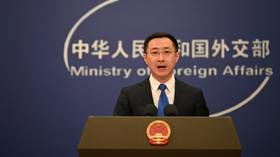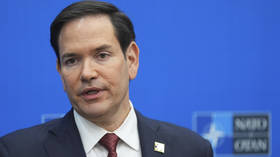‘Traditional masculinity toxic?’ New universe of subtle corruption emerges – Slavoj Zizek
The Czech-born writer Milan Kundera once wrote an entire book about an atmosphere where one joke made in bad taste can ruin your life. It's no joke now, as denouncing colleagues becomes normal in the US.
Recently, the boffins at the American Psychological Association (APA) proclaimed “traditional masculinity” as toxic.
With no apparent shame, here are the exact words they used: “Traits of so-called ‘traditional masculinity,’ like suppressing emotions & masking distress, often start early in life & have been linked to less willingness by boys & men to seek help, more risk-taking & aggression - possibly harming themselves & those with whom they interact.”
Also on rt.com Toxic masculinity: American Psychological Association says it’s bad to be a manWhat makes this statement really dangerous is the mixture of ideology and ostensibly neutral expertise: a strong ideological gesture of excluding phenomena considered unacceptable is presented as an impartial description of medical facts.
How can one not recall here the notorious Serbsky institute in Moscow (thriving even now!) which, in the Soviet years, was well known for categorizing dissidence as a form of mental illness?
And exactly the same happens when we designate masculinity as “toxic,” under the cover of medical expertise. It amounts to the imposition of a new normativity, a fresh figure of the enemy.
New Normal
Indeed, if, in the old days of heterosexual normativity, homosexuality was treated as illness, it is now masculinity itself which is medicalized and turned into a sickness to be fought. Thus, all the references to power, patriarchy and oppression of women cannot obfuscate the ideological brutality of the operation.
Plus, the fact the APA is involved makes it clear we are not dealing with an excess of “Cultural Marxism” because the APA is the psychological wing of the medical establishment. So, we are talking about nothing less than a shift in the mainstream ideological hegemony.
Also on rt.com Current trends in self-reproach & guilt serve interests of elites – Slavoj ZizekThe contours of this shift become clear the moment we take a closer look at the list of features supposed to characterize “toxic masculinity”: suppressing emotions and masking distress, unwillingness to seek help, a propensity to take risks even if this involves a danger of self-harm.
Which raises the question: what is so specifically “masculine” about this list?
Does it not fit much more as a simple act of courage in a difficult situation where, to do the right thing, you have to suppress emotions because you cannot rely on any help but take the risk and act, even if this means exposing yourself to harm? Obviously, in our age of Politically Correct conformism, such a stance poses a danger.
But What is replacing courage?
First Hand
A recent experience of mine tells a lot in this respect. I was involved in defending a colleague against an accusation from a graduate student that they had solicited unwanted intimacy between the two.
What shocked me was the career reference which was evoked to render non-problematic the behavior (of the accuser, in this case). I don't know the accuser, I never met him and didn't read anything written by him except his publicly available emails.
My point is: let's suppose all he says is true – he was disgusted and oppressed etc. So why did he fully reciprocate her messages and sometimes even heighten their emotional tone? His repeated answer is a reference to his career, as if this were taken as a given.
Also on rt.com Slavoj Žižek: Until the rich world thinks 'one world,' migration will intensifyIs this “justification by career” really so self-evident? When I made this point, I was predictably accused of not understanding how power functions in US academia – nothing could be less true: from the 1970s when, after graduating, I was unemployed for years (yes, for NOT being a Marxist) ‘til recent times, when I was almost exiled from the US academia and public media because of my "problematic" positions (critique of Political Correctness, etc.).
As a result, I was able to observe how power works in all its guises. I don't expect people to be heroic, I just think that there are certain limits, both professional (betraying one's theoretical vocation – if one has it, that is to say) and private (writing passionate emails to a person one finds disgusting, like the accuser did), that one should not violate.
This is how “toxic masculinity” is left behind in the new Politically Correct atmosphere where one joke made in bad taste can ruin your career but ruthless careerism is considered normal. A new universe of subtle corruption is thus emerging, in which career opportunism and the lowest denouncing of colleagues presents itself as high moralism.
Like this story? Share it with a friend!
The statements, views and opinions expressed in this column are solely those of the author and do not necessarily represent those of RT.















